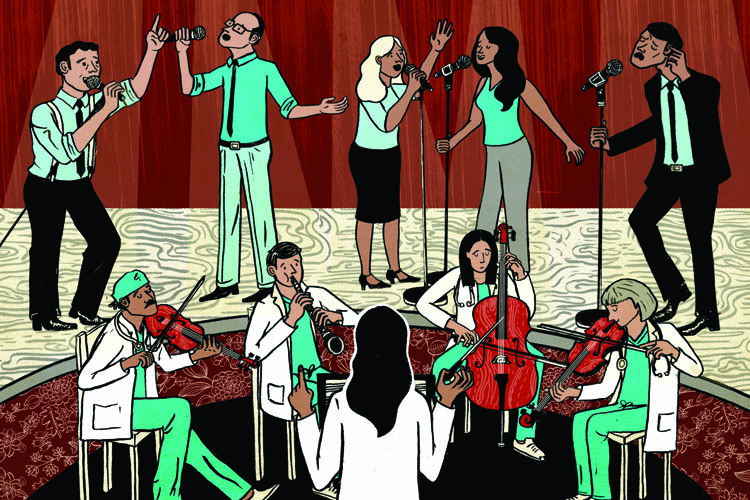Medical Musicians
With the medical world up to their necks in the COVID-19 virus outbreak, medical people will not be getting much rest. But when things do get back to normal, they will be turning back to one of their greatest loves, and that’s music-making.
The number of musicians among the medical fraternity across the world is much higher than any other organisation. My question is why does music attract more doctors and medical staff than other professional organisations? And why music? Why not dance? Why not poetry?
I think that The Dancing Doctors would be a great title for a dance group. And for a group of medical bards, they could be called the Poetic Practitioners.
Medicine and music go hand in hand in more ways than one. Think of music therapy for the sick, and music that helps the healing process, as I wrote about in an early article titled Music Can Heal You.
Doctors and medical people have a special connection to music. Just when this connection hit those in the medical fraternity is up for debate. Some say it is music that leads them into a career in medicine. Dr Lily Vrtik, who is a plastic surgeon and the Marketing/Sales/Sponsorship Manager for the Queensland Medical Orchestra and Choir, says, “Our orchestra and choir are filled with health professionals who play and enjoy music. Most of whom started life in music before they entered the health profession”.
Dr Vrtik goes on to say that it’s “the work ethic, the commitment and the tenacity which we learn from musical training that drives us in all aspects of life, and thus translates to our successes in academia and drives us to higher professions”.
Performers in the Australian Medical Students’ Orchestra agree with Dr Vrtik. They say that “Maybe because it’s a refined intellectual art that requires articulation, attention to detail. Much like the art and science of medicine”. They also say, “The practise and drive to be able to play an instrument taught us how to focus and build the many skills needed to be a doctor”.
Here’s a 2016 promo from the Australian Medical Students’ Orchestra.
An interesting question about medical people turning to or starting with music-making is, do medical people who start out with music become better at their doctoring than those who don’t? People in the Australian Medical Students’ Orchestra suggest that as “music also trains all parts of your brain which makes you a quick thinker etc… which would make someone a good doctor”. You’ll notice they didn’t say a better doctor. However, is it possible that doctors who start out as musicians, could this make them better doctors than the ones who don’t?
In a study published in the International Journal of Surgery, it was found that a “Surgeon’s task performance can significantly be improved by music”. It said that “listening to Mozart and Bach can boost doctors’ performance by up to 11 per cent”.
Ellen Wong Tso, writes for Interlude and teaches piano. She received her Bachelor’s and Master’s degrees in Piano Performance from McGill University and taught there. She says, “I think intelligence, strong memory, nimble fingers and analytical minds are attributes that make them good medical musicians or musical doctors. So I think that medical musicians make better doctors, because of their acute sensitivity and compassion. Also, if they played an instrument well, they had to have precision”.
While there does not seem to be a study that has looked at or suggests people with musical talent make better doctors, there’s a bit of consensus from people who do perform both that there is a connection.
The health of doctors and medical staff is an ongoing concern. Playing music is one way that helps relieve some of the stress that goes with being a medical practitioner. Stefan Willich, who is a cardiologist and researcher, also formed and conducts the World Doctors Orchestra. In an interview for The Lancet, which is an independent, international weekly general medical journal founded in 1823 by Thomas Wakley, Willich says “I think the orchestra also provides a way for its players to balance out the stresses inherent in their busy professional lives”.
There’s a common theme in the replies I received from medical musicians around the world, and that is music and medicine go hand in hand, which helps doctors become musicians and musicians become doctors.
The last word in this article on the benefits of music-making for medical people goes to Myles Lee, MD, President, Los Angeles Doctors Symphony Orchestra.
“From my viewpoint as a retired cardiac surgeon, and having some familiarity with the complexities of music, perhaps the common denominator between the two is the discipline and teamwork required in both fields. I wrote a book entitled ‘Near Misses in Cardiac Surgery’ in which I compared the conduct of a cardiac surgical procedure to a symphony, as follows: “The delivery of cardiovascular surgical care requires the synthesis of multiple disciplines acting in concert to create a carefully orchestrated sequence of events that, like the notes of a symphony, played by a variety of instruments, flow to an inevitable conclusion.” The goal for both surgeons and musicians, it seems to me, is the satisfaction of bringing order out of chaos”.
